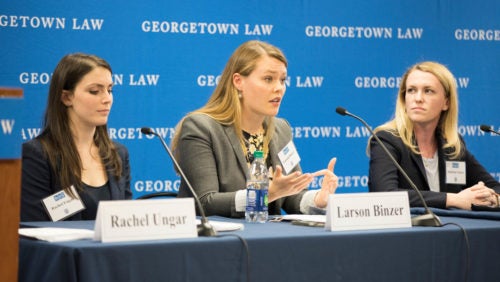2019 Dash Conference: “Human Rights and Vulnerable Migrants”
April 5, 2019

Human Rights Institute Fact-Finding Practicum Students Rachel Ungar (L'20), Larson Binzer (L'20) and Madelyn Carter (L'20) present their findings at the 2019 Dash Conference.
For months, the rescue ship Aquarius patrolled the Mediterranean, pulling aboard migrants and refugees attempting the dangerous journey from the African continent to Europe. Eventually, European governments forced it to terminate its operations, according to Medecins Sans Frontieres, the humanitarian aid group that operated the ship.
To Tendayi Achiume, the United Nations Special Rapporteur on Contemporary Forms of Racism, Racial Discrimination, Xenophobia and Related Intolerance, the docking of Aquarius symbolized the victory of what she calls “racial borders,” or border regimes that “disproportionately limit the mobility of non-whites.”
“Freedom of movement and migration should never be allocated on the basis of race, not even partially,” Achiume said. “A racial equality critique and reform of the global regional governance of migration is urgent.”
Vulnerable Migrants
In her keynote address at the 2019 Samuel Dash Conference on Human Rights, “Human Rights and Today’s Vulnerable Migrants,” Achiume illuminated the long, dark history of how racism and xenophobia are folded into notions and practices of national sovereignty and border policing. She encouraged the lawyers and law students in the room to find creative solutions to challenge racialized border enforcement by using human rights instruments such as the International Convention on the Elimination of All Forms of Racial Discrimination (ICERD).
“At a very basic level, just changing how human rights scholars and advocates articulate the problem to include a racial equality assessment would be huge,” she said. “There’s space and room to use treaties like ICERD to do interesting work… even if we cannot undo racial borders primarily through international human rights law.”
While many associate today’s harsh immigration policies with the Trump Administration, they are actually a continuation of a multiyear pattern stretching back to the mid-1990s, said Donald M. Kerwin, Jr., director of the Center for Migration Studies of New York. He cited decades-old practices such as seconding law enforcement officers from the Dominican Republic and Honduras to intercept migrants en route to the United States, or funding Mexico and Guatemala to limit the number of migrants who could reach U.S. borders.
Today, “[w]e have an administration that has emerged as the least successful…on immigration enforcement in some time, and yet it’s the most hostile to humanitarian and refugee protection programs as well,” said Kerwin. Now is the time, he said, for immigration advocates to elaborate on “the principles, values, and interests that are served by immigration, in ways that we haven’t been forced to do in many, many years.”
Human Rights Institute Fact-Finding
Although migration is a divisive political issue, Georgetown Law students presenting the day’s final panel were optimistic that the two political parties in the U.S. could come together to protect one particularly vulnerable group: the foreign fishermen who man Hawaii’s longline fishing industry, and who are often victims of forced labor.
The ten-woman student team who participated in the 2018-2019 Human Rights Institute Fact-Finding Project found that loopholes in immigration and labor laws left these men at the mercy of their captains, who can pay them less than the going rate of $500 a month, even while working them 20 to 22 hours a day.
Julie Baleynaud (LL.M.’19), Larson Binzer (L’20), Madelyn Carter (L’20), Kelly Horan (L’20), Cara Palmer (L’20), Bethany Pereira (LL.M.’19), Ingrid Schulz (L’20), Charlotte Storch (L’20), Rachel Ungar (L’20) and Melody Vidmar (L’19) presented their findings in the practicum, taught by Adjunct Professor Melysa Sperber, director of Policy & Government Relations at Humanity United; and Ashley Binetti Armstrong, the Dash-Muse Teaching Fellow at Georgetown Law’s Human Rights Institute. Professor from Practice Andrew Schoenholtz, director of the Human Rights Institute, and Georgetown Law Dean William M. Treanor introduced the day’s events.
The fishermen, often from low-income countries such as Indonesia and Vietnam, do not get work visas from the U.S., so they risk deportation if they set foot on U.S. soil. Even when they dock in Honolulu, they aren’t allowed to leave the piers; instead, they receive hot meals and medical care from a ministry that tends to fishermen. But there are solutions, such as offering work visas that would allow them to come onshore. According to Larson Binzer (L’20), it has strong potential to gain bipartisan support.
“Trafficking in general is a bipartisan issue,” Binzer said. “This is about formalizing our immigration system. So as these men are coming in and they don’t necessarily have this formal legal status but they’re just steps away from U.S. soil.”
Binzer offered a hard-to-refute rationale for bringing these vulnerable migrants out of the shadows.
“Formalizing this immigration process is both beneficial to the industry and the fishermen and being able to track and maintain who’s coming into the country for work is definitely something both parties can get behind.”